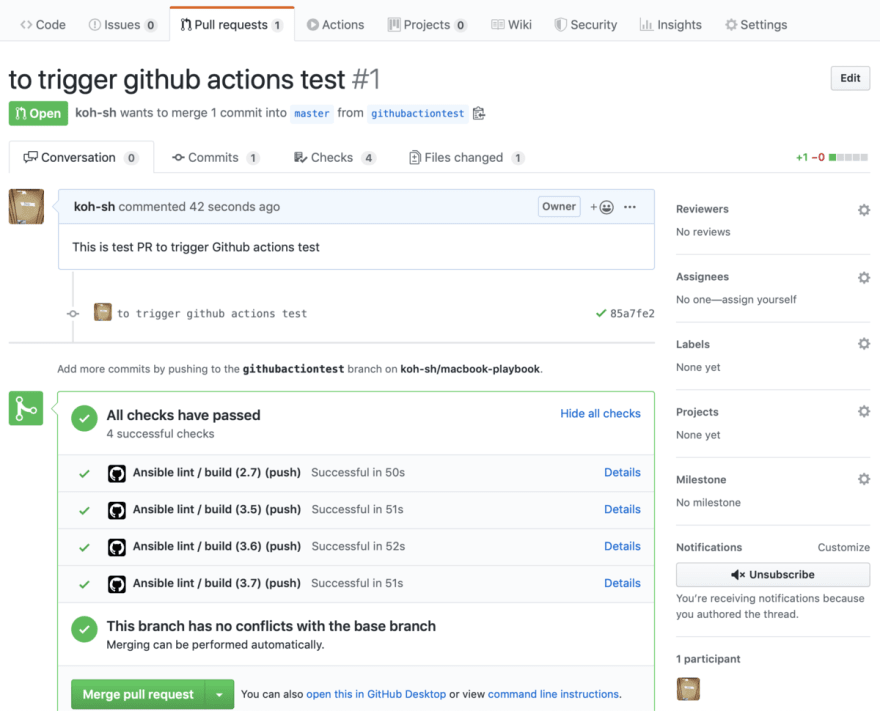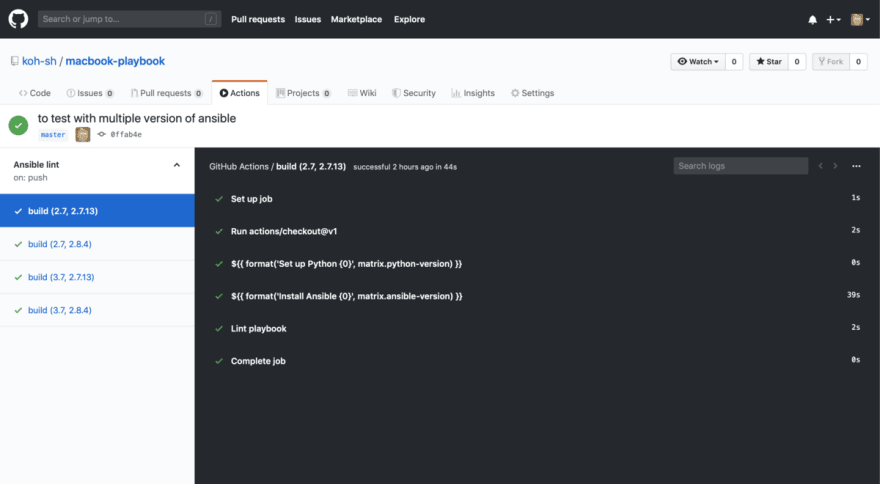Now my account has access to Github Actions beta so I am trying to use it for syntax check and run ansible-lint for my Ansible playbook repository.
This article is based on the specification of Github Actions on 7th Sep 2019.
Configuration
I referred to the official doc for setting up.
https://help.github.com/en/categories/automating-your-workflow-with-github-actions
Until the first run
This time I use my repository which has Ansible Playbook to set up my MacBook.
Clicking Actions tab which is newly added.

You can use many templates of workflow provided by Github and I am using python package.
After clicking the template, you can modify the workflow template for your repo.
I edited the file like below. (I also changed the name of the file too)
name: Ansible lint
on: [push]
jobs:
build:
runs-on: macOS-latest
strategy:
max-parallel: 4
matrix:
python-version: [2.7, 3.5, 3.6, 3.7]
steps:
- uses: actions/checkout@v1
- name: Set up Python ${{ matrix.python-version }}
uses: actions/setup-python@v1
with:
python-version: ${{ matrix.python-version }}
- name: Install dependencies
run: |
python -m pip install --upgrade pip
pip install ansible ansible-lint
- name: Lint playbook
run: |
ansible-playbook site.yml --syntax-check
ansible-lint site.yml
The Playbook is for macOS, so I changed runs-on to macOS-latest.
Below tasks are supposed to run.
- Install ansible and ansible-lint with pip
- run ansible-playbook with --syntax-check option
- run ansible-lint
After committing this file, tests were run automatically.
You can see the result at Actions tab.

https://github.com/koh-sh/macbook-playbook/commit/3daeb98a056981335938e74c530ebb5f6ae1f6e3/checks
The number of python-version is 4 and max-parallel is 4 too so 4 tests were run concurrently.
You can refer to the official doc about the limit of resources.
https://help.github.com/en/articles/workflow-syntax-for-github-actions#usage-limits
You can click each version of builds for details.
This time ansible-lint threw some errors so the status is failed.
Until test success
ansible-lint threw errors so fixing with this commit.
Removing trailing space and omit the error about shell modules with .ansible-lint file as I needed them.
https://github.com/koh-sh/macbook-playbook/commit/577519c6213c4a1e7a3c047808ef146ca2d67f86
I pushed to the master branch and the tests run automatically.

https://github.com/koh-sh/macbook-playbook/commit/577519c6213c4a1e7a3c047808ef146ca2d67f86/checks
Tests are completed without problems.

Also, you can see the results of tests for each commit with symbols.
Trying Pull Requests
How about pull requests?
Let's see how they work.
By opening a pull request, tests run automatically and the results are available at PR summary.

And this repository is integrated into my slack workspace and the result was notified too.
https://slack.github.com

But when I pushed to master, the test result was not notified.
Another setting might be necessary but I haven't checked yet.
Testing with multiple version of Ansible
Currently, these tests are run with the latest version of Ansible and 4 versions of python.
Let's change it to 2.7.x, 2.8.x of Ansible and 2.x and 3.x of python matrix.
I modified the workflow file as below.
name: Ansible lint
on: [push]
jobs:
build:
runs-on: macOS-latest
strategy:
max-parallel: 4
matrix:
python-version: [2.7, 3.7]
ansible-version: [2.7.13, 2.8.4]
steps:
- uses: actions/checkout@v1
- name: Set up Python ${{ matrix.python-version }}
uses: actions/setup-python@v1
with:
python-version: ${{ matrix.python-version }}
- name: Install Ansible ${{ matrix.ansible-version }}
run: |
python -m pip install --upgrade pip
pip install ansible-lint ansible==${{ matrix.ansible-version }}
- name: Lint playbook
run: |
ansible-playbook site.yml --syntax-check
ansible-lint site.yml
After a push, the test setting was updated and run as I intended.

https://github.com/koh-sh/macbook-playbook/commit/0ffab4e73391ab8f3d39d5c149307bab9c06714f/checks
Conclusion
With Github Actions, I can ansible-lint automatically for each commit.
All of the settings in this article took only 1 hour since these are very simple and easy to use.
Also, Github Actions are available not only tests but also deploys too so I will keep trying them out.




Top comments (0)